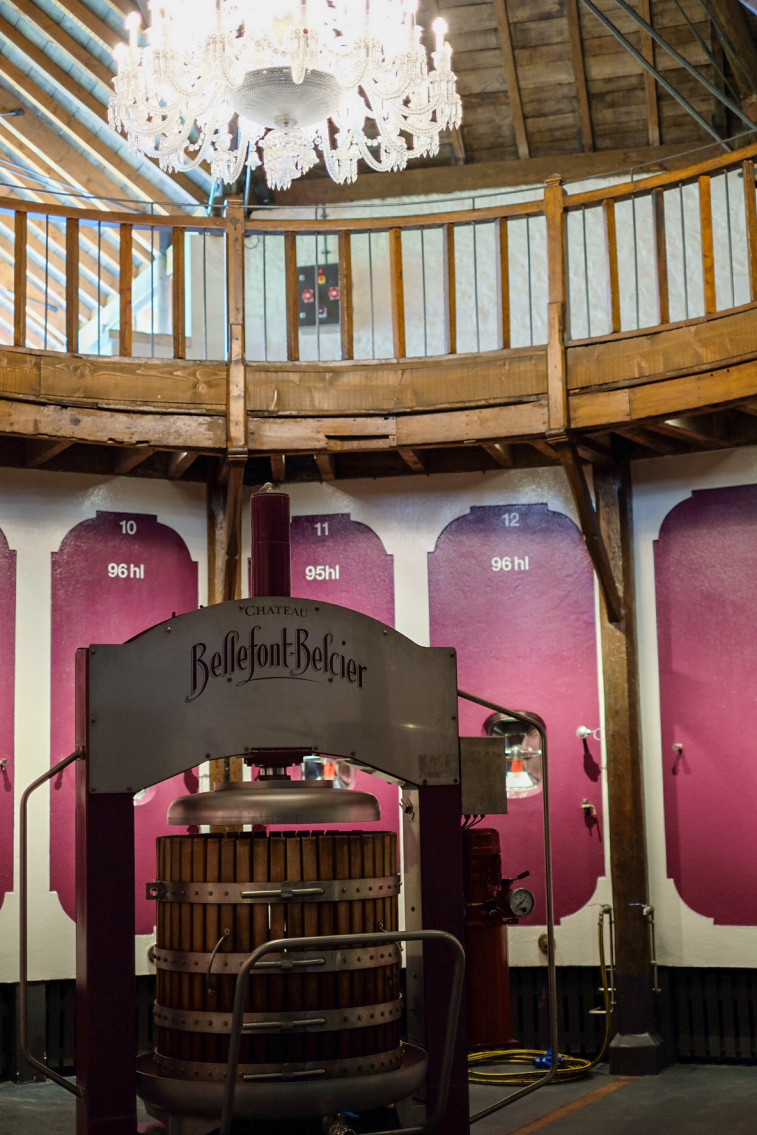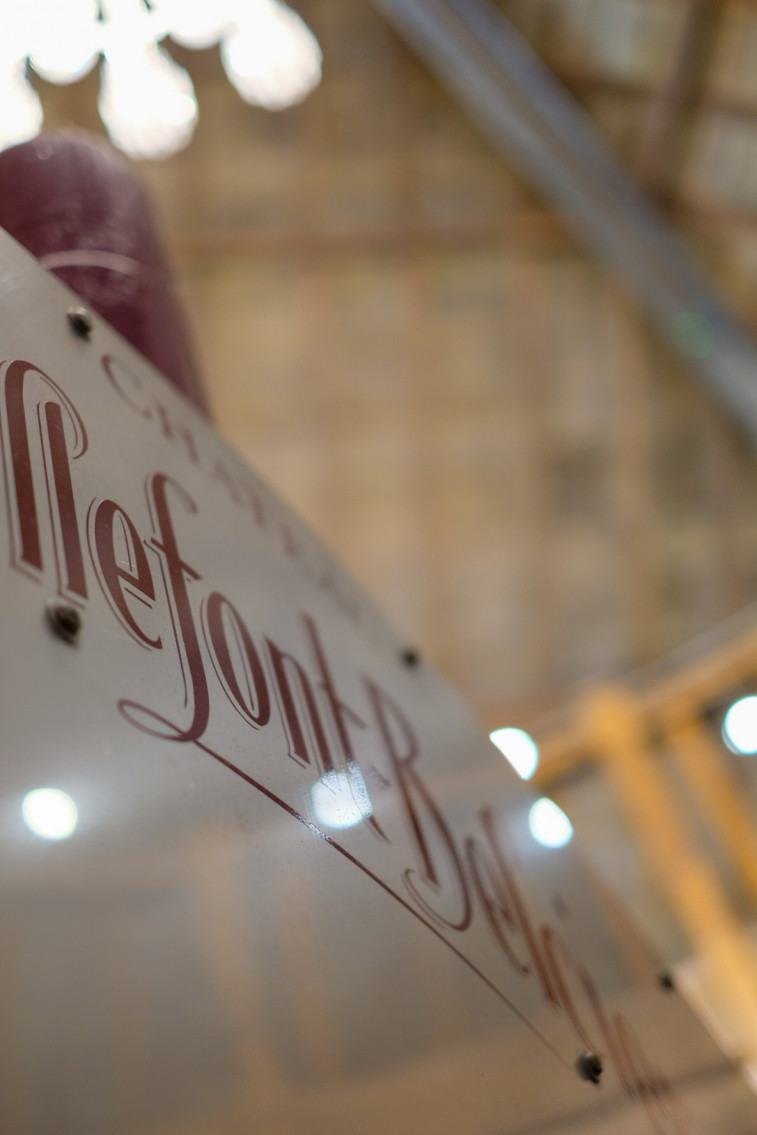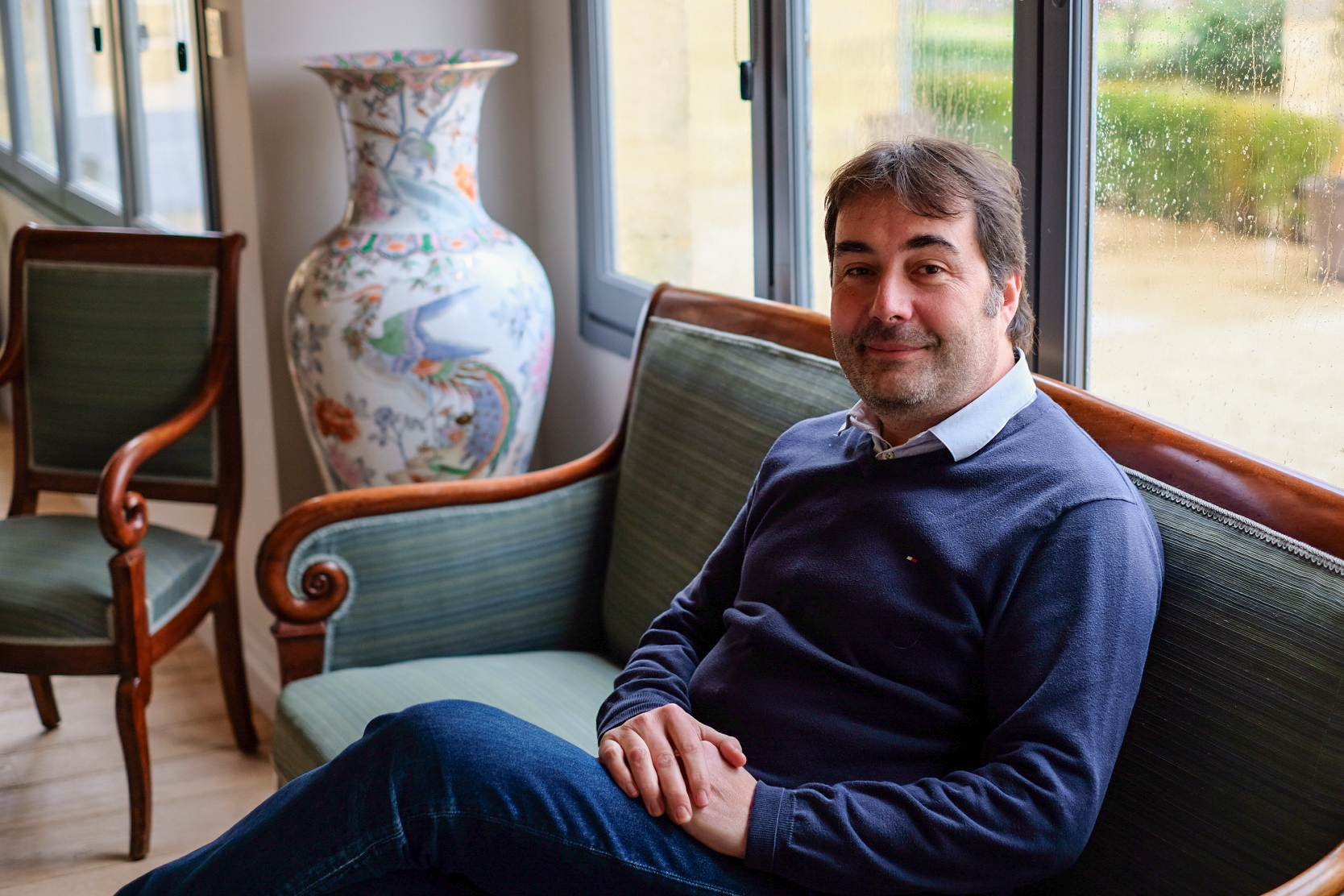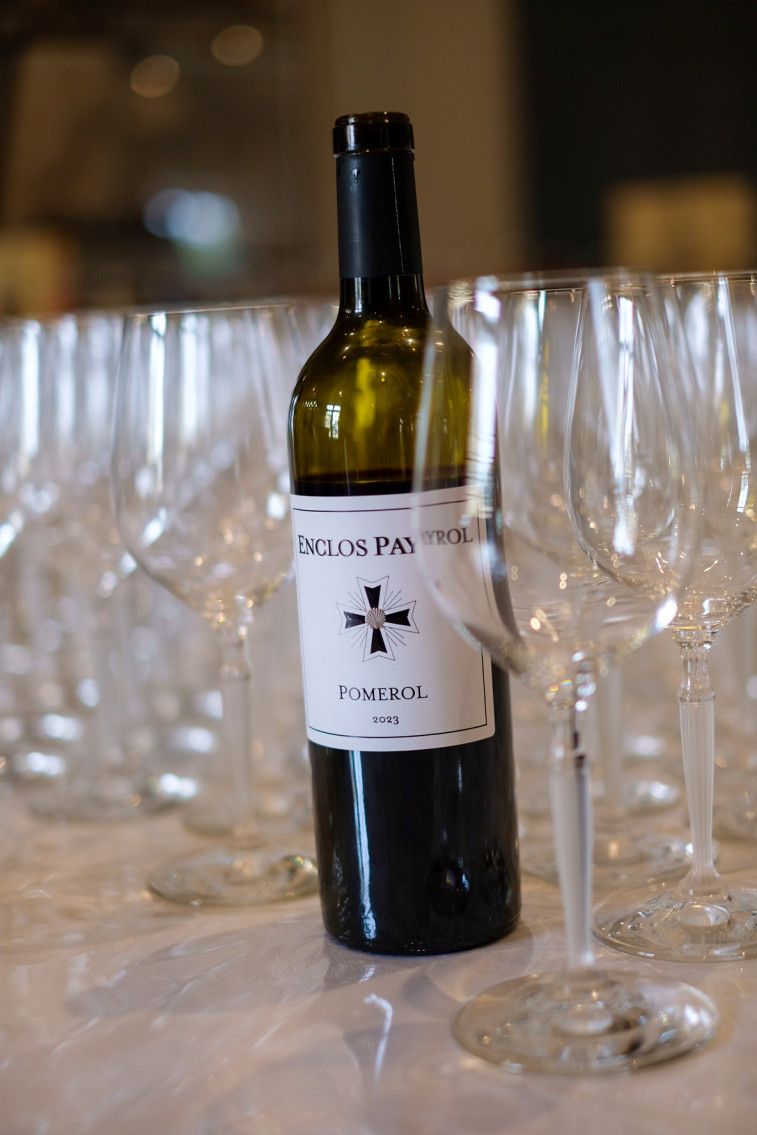Rencontre with Jean-Christophe Meyrou
Jean-Christophe, since 2014, you have been working alongside Peter Kwok in managing Vignobles K, overseeing seven Right Bank estates in Bordeaux: Château Bellefont-Belcier, Château Tour Saint Christophe, Château Haut-Brisson*, Château La Patache, Enclos Tourmaline, Enclos de Viaud and Château Le Rey. These estates embody the alliance of elegance, innovation, and the constant pursuit of excellence.
A man of the field, you are guided by sharp intuition and an ability to seize opportunities. Your natural kindness and humility bring a distinctive dynamic to the projects you lead, marked by freedom and relevance. Attuned to market expectations, you manage the estates with boldness, never hesitating to step outside traditional frameworks. Each cuvée thus carries a unique identity, born at the crossroads of terroir and the values of Vignobles K.
Today, you invite us to explore this singular journey, where rigor, daring, and respect for time come together to shape the future of these great wines.
*This château has been sold to Stéphane Schinazi; Vignobles K continues to provide technical and commercial follow-up.
What do you think of this introduction?
When it comes to the wines, it truly reflects the spirit we aim to instill. On a more personal level, I find it harder to evaluate myself. What seems essential to me is the privilege we have to work in an environment of kindness, supported by a family and, above all, by one man: Peter Kwok. He handed us the keys to the truck, and it is up to us to drive it to the right destination, with genuine freedom.
It’s an opportunity we try to make the most of, while taking into account our constraints in terms of size and budget. The company lives off the sale of its bottles, and there is no monthly external funding: it is a real, very healthy economy.
The trust between Peter and me is such that we even bought an estate together. For me, this professional adventure is also a story of friendship. Working with a friend is never trivial, it requires careful thought, and I hesitated a lot before committing. But today, that bond of trust is one of the cornerstones of my commitment.

What have been the key moments of your career?
I began in the négociant business, working in sales while also leading a project management mission on a property in Argentina, Alta Vista. That was in 1997, a year complicated by the El Niño phenomenon. At the time, we only produced 10,000 bottles. By the time I left the project in 2005, we had reached 3 million bottles sold. We succeeded in building a strong team, achieving our goals in both production and distribution. I greatly enjoyed working as a wine merchant, but at that moment I discovered something truly fascinating: the management of an estate and the ability to bring a vineyard back to life.
In 2005, I accepted the position of director of the vineyards owned by Catherine Péré-Vergé, where I remained until 2010. At her side, I learned a great deal, and we experienced some memorable moments, such as the 100-point score awarded to La Violette. It was a remarkable opportunity to learn.
Afterwards, I joined the Adams family, owners of Fonplégade and L’Enclos. Beyond the quality of their wines, their main need was organizational. It was supposed to be a short-term mission, as at the same time, Peter Kwok – who had already owned Haut-Brisson since 1997 – was sharing his ambitions with me. We had known each other for a long time. Peter often came to our house on Sundays for lunch, gathered around a family roast chicken with the children. A genuine friendship had been built.
By 2010, Peter had reached a certain maturity in the wine world and felt ready to take his adventure to a new level. I supported him in the acquisition of several properties, notably in Pomerol (La Patache, L’Enclos de Viaud, and what would later become Tourmaline), while he acquired Château Tour Saint Christophe.
In 2014, the story took a new turn: we decided to structure everything under a single entity, Vignobles K. I officially took on my role on January 1st, with the intention of surrounding myself with a trusted team composed of people I had already worked with over the years.
How did it happen?
Peter Kwok is often – wrongly – classified among the “Chinese investors.” That is a mistake: he is Vietnamese. And above all, his approach is radically different from that of many foreign investors. Where some are content to quickly buy a wine estate, Peter took the time to observe, to understand, to train himself in the field with Haut-Brisson, and even to make mistakes.
It was only after this learning phase that, in 2010, he decided to acquire new estates. His vision? To awaken “sleeping beauties” such as Bellefont-Belcier, or to invest in lesser-known but promising properties like Tour Saint Christophe. Each acquisition is based on strong potential, with a long-term viticultural investment logic. This means carefully calibrating the initial commitment to avoid turning the estate into a fragile diva.
This philosophy reflects Peter’s mindset: behind the appearance of a “small” man lies a great one. His strength is his ability to surround himself with competent people and to foster a collective dynamic. If everyone rows in the same direction, things move faster and further.
In Bordeaux, this is not always the case. Too often, estates showcase a beautiful façade while, behind the scenes, the vineyard, cellar, and office teams are at odds with this image. Peter understood that human cohesion is just as strategic as the quality of the terroir.

What does it take to be a good leader?
Rule number one is to be “kind” – in the sense of benevolence and genuine human kindness. That’s what builds trust and well-being within the team. Then, on a daily basis, it’s about listening. But let’s be clear: this isn’t a watered-down version of management: when something isn’t right, I say it plainly.
We are committed to seeing our team members grow with us. Staff turnover is low, and when people do leave, it’s usually because opportunities on the Left Bank arise. I’m happy about that: seeing former colleagues move on to prestigious estates is a real source of satisfaction. Ten years ago, I probably would have struggled more to accept it. Today, it’s the opposite: we project a healthy and positive image. During recruitment, we’re fortunate to attract both promising young talent and experienced professionals. That’s a great reward, and a real source of pride for the company.

How are the seven Vignobles K estates managed?
The common thread is the identity of Vignobles K. Each estate has dedicated positions, including a resident cellar master, but we also encourage a collective dynamic. For example, the teams regularly come together around the experimental cellar or joint projects, such as the latest cuvée we launched, Right Bank, which allows them to step out of their routine and challenge themselves.
The technical managers, led by the talented Emmanuelle Fulchi d’Aligny, move from one estate to another. The vineyard workers and tractor operators have a home base, but they rotate according to needs. This organization provides both variety in tasks and great flexibility. In case of the unexpected, teams can easily cover for one another.
What defines the typical character of Vignobles K?
Above all, we aim to produce distinctive wines. Everyone claims this, but for us, it’s reflected in the tasting: our wines naturally carry the Vignobles K signature, with a precise protocol, yet each one fully expresses its terroir.
In Saint-Émilion, Bellefont-Belcier, Tour Saint-Christophe, and Haut-Brisson represent three different expressions of the appellation.
Haut-Brisson, on its gravel soils, produces charming wines.
Bellefont-Belcier, on the southern slope, expresses a tactile elegance thanks to exposed limestone.
Tour Saint-Christophe, in a cooler, later-ripening sector, emphasizes power: a real “boxer,” with vibrant tannins supported by excellent pH.
In Pomerol, the diversity is just as marked:
La Patache, on gravelly terrain, offers softness and roundness, and has become highly sought-after.
Tourmaline, from parcels located on the plateau—the holy grail of Pomerol – delivers density and depth, with a timeless intensity.
Enclos de Viaud, finally, embodies the spirit of contemporary Bordeaux: a great wine with genuine drinkability and remarkable value, capable of winning back many enthusiasts to the appellation.
The singularity of Vignobles K lies in a shared identity but with multiple expressions, where each wine plays its role fully.
In managing these estates, one senses a strong managerial presence. Since 2014, what has been your boldest decision?
Joining Peter was undoubtedly my boldest decision. It meant leaving Château Le Gay, La Violette, Fonplégade… And on January 1, 2014, when I arrived at Tour Saint-Christophe, we had just harvested the 2013 vintage, and the château was still relatively unknown. I had in mind a wine-tourism project, developing sales on the Bordeaux market… but we had to start from scratch. Even though I was fortunate to be surrounded by a strong team and to reunite with former colleagues, I experienced a deep moment of solitude.
The challenge, the desire to work with people I admire – including the Kwok family – and the conviction of the terroir’s potential were my motivations. I also faced an additional pressure: not to disappoint a friend to whom I had made a commitment.
While the challenge and adrenaline excite me, the quality of life matters too: living just a few kilometers from Saint-Émilion. Ultimately, this meant much more to me than a higher salary I might have found elsewhere.
What is the secret to long-term success in this position?
I have no work-life balance (laughs): I sleep two to three hours a night and have always kept a négociant activity on the side. I work a lot… but I love it.
Wine is a complete experience: from the vineyard to the cellar, all the way to the final customer. I am driven by the desire to always be one step ahead, to dare to be a little different from the others. It is this passion that gives me the energy to carry on.
How do you stay one step ahead?
On the commercial side, staying one step ahead means working harder than others, going to the markets, being present. Vignobles et Châteaux is a good example: you created an unprecedented model by going directly to the end customer. That was smart. (Nicolas: this is because we hadn’t had formal higher education, we had dreams in our heads, and we went for it. Today, our model is unclassifiable: négociant, wine merchant, and wine bar combined…)
And this model may be the most resilient today: staying in touch with the market is vital. Otherwise, you’re dead.
I learned this early on in Argentina, when I was handling the U.S. market. I traveled with a rolling suitcase full of bottles, visiting every state, even the most remote. You present, you explain, you give it your all… and if you’re convincing, by the end of the day, you leave with 100 cases sold!
Just last year, during a trip to the United States, I stopped in Minnesota to meet one of the largest distributors in the state. He told me, “Great, it’s been a year since I last saw someone from Bordeaux!” How can you forget a partner of that weight? You can’t just send Excel spreadsheets. It’s simply common sense.
And being one step ahead is also a matter of drive. If you’re motivated, ideas flow. I even encourage my teams to propose ideas. I don’t approve everything, but it fuels my thinking. The important thing is to never lock yourself into a rigid expert-only mindset.
You don’t fit into a single category - have you cultivated that?
Yes, of course. I love this diversity, which makes the job so stimulating. The technical side comes naturally from our activity at Vignobles K: as our wines gained a strong reputation, we were asked to provide technical support externally. We’ve handled several projects, notably one in Tuscany where we’ve been involved since 2015, and I find it fascinating. I also have the necessary networks, press, distribution to support development.
My technical team is solid, with well-structured expertise and well-organized crews. It’s a gratifying form of recognition that’s very motivating. At the moment, I’m working on two investor projects coming into Bordeaux: we conduct technical audits up to the purchase, then provide follow-up if the project materializes. This keeps things from becoming routine, and I realize I perform at my best under pressure. Sometimes perhaps a little too much!
And all of this is only possible thanks to one key person who enables us to carry out these projects .
Enclos Payrol: how did this project come about?
We have three exclusivities – wines distributed by a single operator – which was convenient for me at the start, as it allowed me to focus on the other wines. Enclos Payrol cropped up along the way with friends like you, Vignobles et Châteaux.
The parcel, located in Pomerol, could have been incorporated into Enclos Tourmaline, but here there was a genuine human partnership, a relationship of trust. From that grew the creation of this additional cuvée in the cellar for the team. With around 1,800 bottles, it has its own identity, very true to its plot, and there is only one point of contact: Vignobles et Châteaux.
It’s an established label that resonates with your clients. It shows that serious wines can be made while having fun!
In that spirit, we launched Right Bank, a synthesis of all our terroirs: on the nose, the exuberance of the blue clays of Castillon; on the palate, the texture of Lalande and Pomerol; and on the finish, the limestone plateau of Saint-Émilion. This wine offers another perspective on Bordeaux, a different approach. Production will increase to 10–15,000 bottles, and I don’t rule out raising it further.

Is there a risk of losing clients with such a multitude of projects?
No, on the contrary, it opens new doors. It allows us to diversify our client base—the true secret of commerce! The key to Vignobles K’s success lies in this explosion of diversity at the distribution level.
Who have been your mentors?
The first priority is to navigate the current crisis as best we can, without cutting prices. This involves “cleaning up” the Place de Bordeaux of old vintages, with precise commercial operations while maintaining prices. We are fortunate to be solid, but like everyone, we have been affected. The goal is to find solutions: the wines are good, and I am determined not to sell them off cheaply. The aim is to emerge from this crisis stronger. We keep our heads down, work, and move forward quietly.
On a more exciting note, there is Axiome, a cuvée in collaboration with Usseglio in the Rhône Valley, composed of 50% Châteauneuf-du-Pape and 50% Saint-Émilion. This project has historical significance and it’s delicious! We are starting sales of the 2020 vintage.
The development of Château Bellefont-Belcier is also a key step: this estate suffered from a somewhat old-fashioned image, and the goal is to change those preconceptions in the minds of wine enthusiasts. Hosting clients on site is an incredible lever: we welcome both private and professional clients, and wine tourism has represented 20% of our activity over the past ten years, with seven full-time staff. Beyond profitability, these experiences create true ambassadors. For example, during a recent tasting in Germany, several clients told me they knew the estate because they had visited in person, which is a huge trigger for purchasing. A colleague from the Left Bank who was with me even asked jokingly if I had paid all those people.
Stream of consciousness
Film: Tous les matins du monde with Jean-Pierre Marielle. A film that left a lifelong impression on me, even if it speaks to very few people.
Music: Chopin, because he accompanies me all the time. His music carries and soothes me. I’ve even gone as far as visiting his grave several times. At the moment, I’m listening to Barbara on repeat. My taste is quite eclectic: recently, I literally crushed my team at a blind test. For the record, I was a DJ for six years to finance my studies.
Book: The Spinoza Problem by Irvin Yalom, the last book that deeply moved me, gifted by Jérôme Aguirre.
A dish that saves everything: œuf meurette. I love this authentic and comforting cuisine.
A celebrity/person you’d dream of dining with: Jesus, to understand… though I’d ask for an introduction from a great fanatic! Otherwise, people with vision. Recently, I was listening to a program on General De Gaulle, so it would be him.
Which bottle would you choose for this dinner? A great Pomerol, for example, Château Trotanoy.
A destination: I would return to Israel tomorrow. I lived there for a while, and I would be very happy to walk again through the streets of Jerusalem.
A belief or mantra: I don’t have a set phrase, but since I’m always on the move, I usually take three seconds to reflect and ask myself: “What can I do to improve?”
A bad habit: Being uncompromising with myself… and sometimes with others. And making jokes that only I find funny.
A refreshing moment: Time spent with my family and friends. Last year, I lost three loved ones, and it made me realize that we never spend enough time with those we care about, nor tell them enough important things. Time passes quickly: you can be in a crowd yet alone at the same time. You have to find balance to live well with yourself and in harmony with others.
Flot de conscience
Propos recueillis par Marie-Pierre Dardouillet, Cépages communication pour Vignobles et Châteaux
Photos : Marie-Pierre Dardouillet